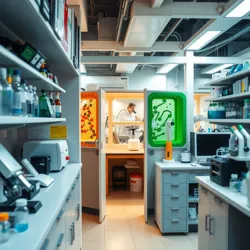Biotechnological Renaissance

The Biotechnological Renaissance refers to a period of rapid advancements and innovation in the field of biotechnology, characterized by significant breakthroughs in genetic engineering, synthetic biology, and biomaterials. This era has been marked by a renewed focus on harnessing the power of living systems to address global challenges and improve the quality of life.
Historical Background
The roots of the Biotechnological Renaissance can be traced back to the late 20th and early 21st centuries, coinciding with the advent of the Transhumanist Movement. The convergence of various scientific disciplines, including genomics, computational biology, and bioinformatics, laid the groundwork for this transformative period. The development of the Human Genome Project and CRISPR-Cas9 gene-editing technology were pivotal events that propelled biotechnology into a new era.
Major Developments
Genetic Engineering
Genetic engineering has been at the forefront of the Biotechnological Renaissance, enabling precise manipulation of DNA to create genetically modified organisms (GMOs) with desirable traits. This has led to advancements in agriculture, such as drought-resistant crops, and in medicine, with the development of personalized therapies for genetic disorders.
Synthetic Biology
Synthetic biology combines principles from engineering and biology to design and construct new biological entities. This field has seen the creation of synthetic organisms capable of producing biofuels, pharmaceuticals, and other valuable substances. The rise of Biohacker Collectives has democratized access to these technologies, fostering innovation outside traditional research institutions.
Biomaterials
The development of advanced biomaterials has revolutionized fields such as regenerative medicine and tissue engineering. These materials, often derived from natural sources, are used to create scaffolds for tissue growth, implants, and prosthetics, enhancing the body's ability to heal and regenerate.
Societal and Ethical Implications
While the Biotechnological Renaissance offers immense potential, it also raises ethical and societal concerns. Issues such as biosecurity, environmental impact, and the potential for misuse of genetic information are subjects of ongoing debate. The balance between innovation and regulation remains a critical challenge.
Cultural Reflections
This period of biotechnological innovation has inspired a wave of creative expression in science fiction and art. Works exploring themes of human enhancement, identity, and the ethical dilemmas posed by biotechnology have proliferated, reflecting society's complex relationship with these technologies.
See Also
- The Genome Alchemists
- Neo-Bio Frontiers
- Synthetic Symphonies
- Cyborg Choreographers
- Festival of Delusions
- The Singularity and Beyond
References
Further reading on the Biotechnological Renaissance and its impact can be found in related topics such as genomics, synthetic biology, and the cultural movements inspired by these advancements.
As we continue to explore and expand the boundaries of biotechnology, the Biotechnological Renaissance serves as a testament to human ingenuity and the potential to reshape our world through science and technology.